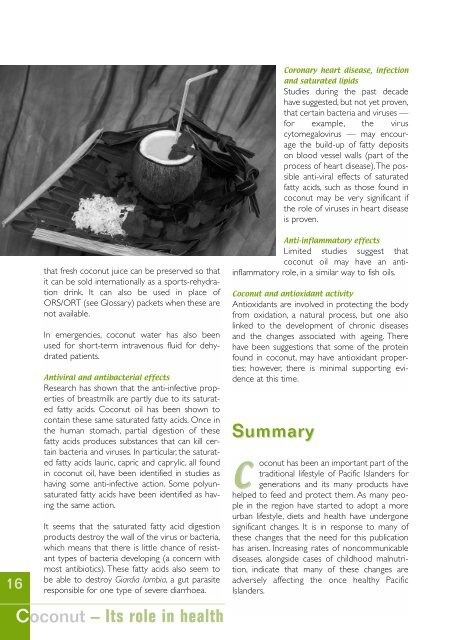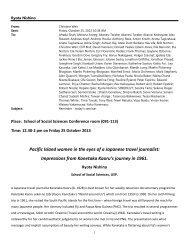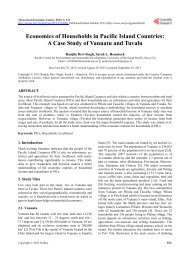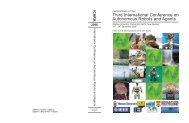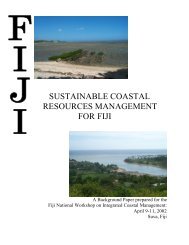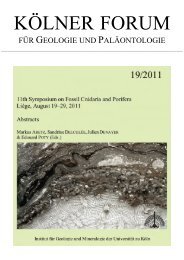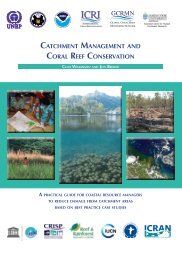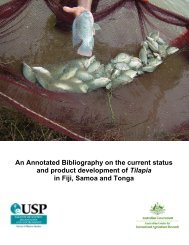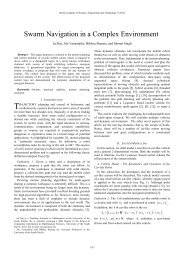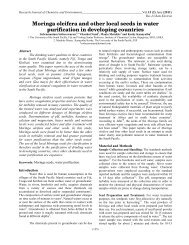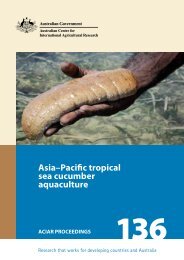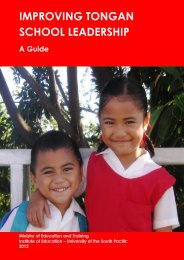Coconut - Secretariat of the Pacific Community
Coconut - Secretariat of the Pacific Community
Coconut - Secretariat of the Pacific Community
Create successful ePaper yourself
Turn your PDF publications into a flip-book with our unique Google optimized e-Paper software.
16<br />
that fresh coconut juice can be preserved so that<br />
it can be sold internationally as a sports-rehydration<br />
drink. It can also be used in place <strong>of</strong><br />
ORS/ORT (see Glossary) packets when <strong>the</strong>se are<br />
not available.<br />
In emergencies, coconut water has also been<br />
used for short-term intravenous fluid for dehydrated<br />
patients.<br />
Antiviral and antibacterial effects<br />
Research has shown that <strong>the</strong> anti-infective properties<br />
<strong>of</strong> breastmilk are partly due to its saturated<br />
fatty acids. <strong>Coconut</strong> oil has been shown to<br />
contain <strong>the</strong>se same saturated fatty acids. Once in<br />
<strong>the</strong> human stomach, partial digestion <strong>of</strong> <strong>the</strong>se<br />
fatty acids produces substances that can kill certain<br />
bacteria and viruses. In particular, <strong>the</strong> saturated<br />
fatty acids lauric, capric and caprylic, all found<br />
in coconut oil, have been identified in studies as<br />
having some anti-infective action. Some polyunsaturated<br />
fatty acids have been identified as having<br />
<strong>the</strong> same action.<br />
It seems that <strong>the</strong> saturated fatty acid digestion<br />
products destroy <strong>the</strong> wall <strong>of</strong> <strong>the</strong> virus or bacteria,<br />
which means that <strong>the</strong>re is little chance <strong>of</strong> resistant<br />
types <strong>of</strong> bacteria developing (a concern with<br />
most antibiotics). These fatty acids also seem to<br />
be able to destroy Giardia lambia, a gut parasite<br />
responsible for one type <strong>of</strong> severe diarrhoea.<br />
<strong>Coconut</strong> – Its role in health<br />
Coronary heart disease, infection<br />
and saturated lipids<br />
Studies during <strong>the</strong> past decade<br />
have suggested, but not yet proven,<br />
that certain bacteria and viruses —<br />
for example, <strong>the</strong> virus<br />
cytomegalovirus — may encourage<br />
<strong>the</strong> build-up <strong>of</strong> fatty deposits<br />
on blood vessel walls (part <strong>of</strong> <strong>the</strong><br />
process <strong>of</strong> heart disease).The possible<br />
anti-viral effects <strong>of</strong> saturated<br />
fatty acids, such as those found in<br />
coconut may be very significant if<br />
<strong>the</strong> role <strong>of</strong> viruses in heart disease<br />
is proven.<br />
Anti-inflammatory effects<br />
Limited studies suggest that<br />
coconut oil may have an antiinflammatory<br />
role, in a similar way to fish oils.<br />
<strong>Coconut</strong> and antioxidant activity<br />
Antioxidants are involved in protecting <strong>the</strong> body<br />
from oxidation, a natural process, but one also<br />
linked to <strong>the</strong> development <strong>of</strong> chronic diseases<br />
and <strong>the</strong> changes associated with ageing. There<br />
have been suggestions that some <strong>of</strong> <strong>the</strong> protein<br />
found in coconut, may have antioxidant properties;<br />
however, <strong>the</strong>re is minimal supporting evidence<br />
at this time.<br />
Summary Summary<br />
oconut has been an important part <strong>of</strong> <strong>the</strong><br />
C traditional lifestyle <strong>of</strong> <strong>Pacific</strong> Islanders for<br />
generations and its many products have<br />
helped to feed and protect <strong>the</strong>m. As many people<br />
in <strong>the</strong> region have started to adopt a more<br />
urban lifestyle, diets and health have undergone<br />
significant changes. It is in response to many <strong>of</strong><br />
<strong>the</strong>se changes that <strong>the</strong> need for this publication<br />
has arisen. Increasing rates <strong>of</strong> noncommunicable<br />
diseases, alongside cases <strong>of</strong> childhood malnutrition,<br />
indicate that many <strong>of</strong> <strong>the</strong>se changes are<br />
adversely affecting <strong>the</strong> once healthy <strong>Pacific</strong><br />
Islanders.


